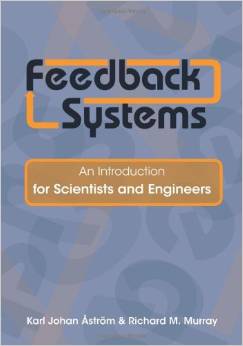
|
FreeComputerBooks.com
Links to Free Computer, Mathematics, Technical Books all over the World
|
|
- Title: Feedback Systems: An Introduction for Scientists and Engineers
- Authors Karl Johan Astrom, Richard M. Murray
- Publisher: Princeton University Press; 2nd edition (February 2, 2021); eBook (Creative Commons Licensed)
- License(s): Creative Commons License (CC)
- Paperback: 528 pages
- eBook: PDF
- Language: English
- ISBN-10: 0691193983
- ISBN-13: 978-0691193984
- Share This:

|
The essential introduction to the principles and applications of feedback systems―now fully revised and expanded
This textbook covers the mathematics needed to model, analyze, and design feedback systems. Now more user-friendly than ever, this revised and expanded edition of Feedback Systems is a one-volume resource for students and researchers in mathematics and engineering. It has applications across a range of disciplines that utilize feedback in physical, biological, information, and economic systems.
About the Author- Karl Johan Åström is senior professor of automatic control at Lund University in Sweden.
- Operations Research (OR), Linear Programming, Optimization, Approximation
- Control Theory and Systems
- Applied Mathematics
- Numerical Analysis and Computation
- Financial Engineering and Financial Mathematics

- Feedback Systems: An Introduction for Scientists and Engineers
- The Mirror Site (1) - PDF
- The Mirror Site (2) - PDF
-
 Feedback Control Theory (John C. Doyle, et al)
Feedback Control Theory (John C. Doyle, et al)
An excellent introduction to feedback control system design, this book offers a theoretical approach that captures the essential issues and can be applied to a wide range of practical problems.
-
 Call Center Optimization: Understanding and Improving
Call Center Optimization: Understanding and Improving
This book gives an overview of the role and potential of mathematical optimization in call centers. It deals extensively with all aspects of workforce management, but also with topics such as call routing and the scheduling of multiple channels.
-
 Foundations of Machine Learning (Mehryar Mohri, et al)
Foundations of Machine Learning (Mehryar Mohri, et al)
This book is a general introduction to machine learning. It covers fundamental modern topics in machine learning while providing the theoretical basis and conceptual tools needed for the discussion and justification of algorithms.
-
 Machine Learning Yearning (Andrew Ng)
Machine Learning Yearning (Andrew Ng)
You will learn how to align on ML strategies in a team setting, as well as how to set up development (dev) sets and test sets. After finishing this book, you will have a deep understanding of how to set technical direction for a machine learning project.
-
 Understanding Machine Learning: From Theory to Algorithms
Understanding Machine Learning: From Theory to Algorithms
Explains the principles behind the automated learning approach and the considerations underlying its usage. Provides an extensive theoretical account of the fundamental ideas underlying machine learning and the mathematical derivations.
-
 Reinforcement Learning: An Introduction, Second Edition
Reinforcement Learning: An Introduction, Second Edition
It provides a clear and simple account of the key ideas and algorithms of reinforcement learning that is accessible to readers in all the related disciplines. Focuses on core online learning algorithms, with the more mathematical material set off in shaded boxes.
-
 Probabilistic Machine Learning: An Introduction (Kevin Murphy)
Probabilistic Machine Learning: An Introduction (Kevin Murphy)
This book is a comprehensive introduction to machine learning that uses probabilistic models and inference as a unifying approach. It is written in an informal, accessible style, complete with pseudo-code for the most important algorithms.





